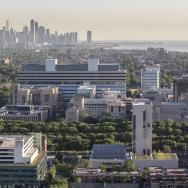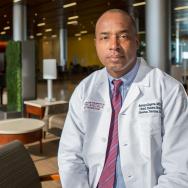A unique approach that provides an ecosystem of trauma-informed care for children and their families who are critically injured or exposed to violence on the South Side of Chicago is getting a big boost, thanks to a $9.1 million gift by the Ellen & Ronald Block Family Foundation and the Hassenfeld Family Foundation.
The gift will integrate and expand clinical and community services under the Block Hassenfeld Casdin Collaborative for Family Resilience, which integrates and expands services and programs at the University of Chicago Medicine and in the community to help young patients and their families recover from the immediate and long-lasting effects of trauma caused by gun, domestic or sexual violence, or child abuse.
The BHC Collaborative for Family Resilience is based on the premise that trauma caused by violence is best treated holistically—starting with personalized care of the child and family in the medical center, and continuing through discharge and recovery, even extending into the home, school and neighborhood—through a network of community resources.
“The genius of this program is that the community and medical center are true partners, each bringing their expertise, from working together on the initial design to making improvements along the way. This kind of real change takes the efforts of so many people—respecting, trusting and supporting each other—and a commitment to the long term,” said Ellen Hassenfeld Block, a member of the Board of Trustees at the University of Chicago Medical Center. “We are excited to support this effort and are grateful to everyone from everywhere who has worked tirelessly to create this collaborative, for their ongoing contributions, and for their commitment to a long term future that we too share, seeing that all children and families in our community are safe from violence, resilient, healthy, and can grow up and thrive.”
The investment comes as UChicago Medicine marks the one-year anniversary of the May 2018 launch of adult trauma care. The Level 1 Adult Trauma Center added to UChicago Medicine’s pediatric trauma and burn services, thereby providing a comprehensive system of care to treat the full range of trauma injuries in patients of all ages.
UChicago Medicine has cared for 3,058 trauma patients from May 1, 2018 through March 31, 2019. Of those, 276 were pediatric trauma patients. UChicago Medicine Comer Children’s Hospital has been a designated pediatric trauma center since 1990.
The gun violence epidemic continues to affect communities across the country. In 2017, there were 14,542 deaths caused by intentional gun violence, based on data from the Centers for Disease Control and Prevention, which has yet to release 2018 figures. According to the Chicago Police Department, 561 residents were killed and nearly 3,000 were injured by a gun in the city in 2018—causing a ripple effect of trauma-related physical and mental-health consequences for families and children who live in communities like those on the South Side.
“The public health crisis of intentional violence and its traumatic after-effects require innovative approaches that knit together the strengths and resources of institutions, individuals and community-based organizations alike,” said Kenneth S. Polonsky, dean and executive vice president for medical affairs at the University of Chicago. “We are most grateful for this generous gift and for the new opportunities offered by the BHC Collaborative to significantly expand trauma recovery programs and further strengthen the network of care and services on Chicago’s South Side.”
The BHC Collaborative for Family Resilience
The model represents a dramatic shift in trauma care: Instead of providing only medical care to trauma patients, the BHC Collaborative approach includes wraparound services to help children and their families during and following their hospital experience. This means offering mental-health and social-service support, health care navigation, help finding housing or child care, and much more.
The structure was driven by the ideas and input of UChicago Medicine’s Community Advisory Council, which is made up of civic and faith-based leaders who provide guidance on key health concerns that affect residents of the South Side.
“When we think about ‘trauma care,’ we have to think broad. It’s extensive. It’s deep. It’s responsive. It’s relational. It’s holistic,” said Sherida Morrison, founder of the community-based organization Demoiselle 2 Femme and a CAC member who advises UChicago Medicine on child and maternal health issues. “The impact will go long beyond the gift as our children grow into healthy adults, and we create a healthier city.”
Key components of the BHC Collaborative involve:
- Helping children navigate their hospital experience by providing 24/7 Child Life interventions in the UChicago Medicine Comer Children’s emergency room and support for children whose loved ones are treated at the Level 1 Adult Trauma Center. “For young patients in urgent or dangerous circumstances—such as child abuse or neglect, suffering from a gunshot wound, or victimization in human trafficking—the hospital can be another unfamiliar place amidst a crisis,” said John Cunningham, chair of the Department of Pediatrics and physician-in-chief of Comer Children’s. “This investment will help ensure that every child affected by trauma can benefit from the calming, compassionate care of a child life specialist.”
- Providing wraparound resources to support the holistic needs of children and families experiencing trauma and linking them to specialized, trauma-informed counseling services, including Healing Hurt People-Chicago, a nationally recognized trauma intervention program that provides such services as group therapy and mentoring; the REACT program, which offers assessment, trauma-focused psychotherapy and medication management services for children; and other community-based social support. “Our work cannot stop in the ER or operating table,” said Selwyn Rogers, director of the Trauma Center and chief of trauma and acute care surgery. “We need to address trauma from a public health perspective through prevention, intervention, collaboration and community building.”
- Investing in community-based organizations that provide critical resources aimed at helping children, families, and the community build long-term resiliency from trauma and violence.
“Whether through our Violence Recovery Program, Comer Children’s Child Life Services, Healing Hurt People or one of our community partners, this gift will greatly expand our capacity to support our most vulnerable young patients as they recover from traumatic events,” said Brenda Battle, vice president of UChicago Medicine’s Urban Health Initiative and chief diversity, inclusion and equity officer. “At the same time, the BHC Collaborative’s investments in the community will help nurture and grow the trauma recovery ecosystem that works to bring hope and healing to families and communities, and build resiliency on the South Side. It is our hope that this program becomes a model for other communities facing similar circumstances.”
—Adapted from a story that first appeared on the UChicago Medicine website.

